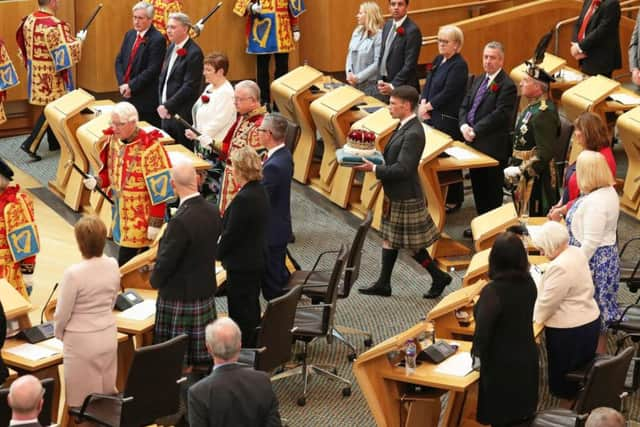Tribalism in Scottish politics has led to 'disappointing' development of Holyrood


Two decades after the establishment of the Scottish Parliament, members of the group which drew up the blueprint for it said while there has been a "great deal of success", there are also disappointments in how Holyrood has developed.
The Consultative Steering Group (CSG) said one of the biggest disappointments is that "the Parliament's committees have not emerged as a power in the land in the way that we had hoped".


Advertisement
Hide AdAdvertisement
Hide AdBut the group admitted "any call for more members is one that is unlikely to be popular with the public".
It added: "If we are serious about looking to our Parliament to lead on the big issues of the day and to do so in a collaborative, mature, cross-party way, this should not, in our view, be automatically discounted from discussions."
Their report, commissioned by Holyrood's current presiding officer Ken Macintosh, considered whether the Parliament has lived up to expectations.
Mr McLeish, chair of the CSG, said: "While we could never have imagined in the late 1990s what Scotland and the world would look like in 2019, we are pleased that the foundations we recommended for the Parliament were solid. It has been a huge success in its first 20 years.
"That said, all institutions must continue to evolve to ensure they are relevant and responsive to the environment they are operating in. We hope that our thoughts are a helpful contribution to the ongoing work around parliamentary reform."
Political parties have "dominated the debate", they said, adding: "The tribalism we have seen has blunted the scrutiny function of the Parliament and has prevented, in most cases, a pluralistic approach to policy scrutiny.
"On broad areas such as wealth creation and climate change, there can be little that separates the parties, yet we see a reluctance among the parties to come together to present a community against the challenges of the world."
The group originally hoped Holyrood's committees would see MSPs develop expertise in different subject areas and "bring an informed view to the consideration of legislation and scrutiny of the Scottish Government".
Advertisement
Hide AdAdvertisement
Hide AdThey also hoped committees would bring forward their own legislation, but said in practice this had rarely happened, noting that in 20 years only seven committee bills have been passed, with most of those being in relation to internal, technical matters for the Parliament
Members of the group said they were "disappointed that committees have not emerged as a more powerful voice in debating policy and legislation".
They said they did not foresee Holyrood would pass the amount of legislation it has in the past two decades, highlighting the "sheer weight of the legislative function on committees as a result".
With this "unlikely to change given the additional powers that have now been devolved", they suggested separate Bill committees should be set up to scrutinise legislation, saying this would allow the existing committees "greater scope to develop policy, whether on their own initiative or influencing at an earlier stage the development of government policy".
They also said committees should have elected conveners - an idea already being considered by Parliament's Standards, Procedures and Public Appointments Committee.
As it stands, committee conveners are appointed by parties at Holyrood, but electing them would "strengthen the independence of committees and give a clearer mandate for holding the government to account on behalf of the Parliament as a whole", the report said, as well as providing an alternative career path for MSPs.
Mr Macintosh said: "The CSG's contribution to setting up the Parliament was so valuable I thought in this, our 20th anniversary year, we should capture their reflections on how the Parliament has performed against the founding principles."
He said the report "provides us with a number of interesting, challenging ideas" that would "be a great contribution to the ongoing debate on how the Parliament can continue to grow and develop".
